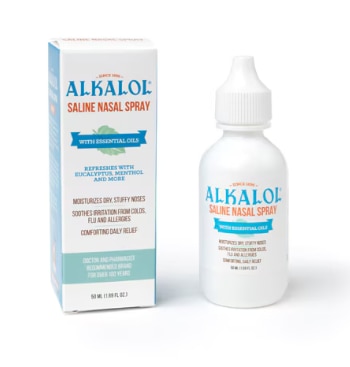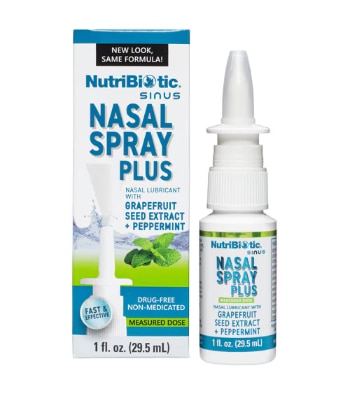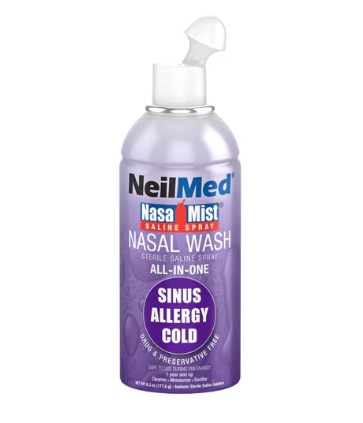Winter has returned, and that means cold and flu season is now underway. Soon, many of us will be reaching for nasal spray to clear congestion.
But is that a good idea?
There is no doubt that millions of people have found relief from nasal sprays that clear mucus and reduce swelling.
“Nasal sprays are helpful when you’re dealing with nasal congestion, runny nose or irritation caused by allergies,” says Dr. Hussain Ahmad, a physician based in the UK and consultant practitioner at Click2Pharmacy. “They can manage symptoms like sneezing and a blocked nose.”
However, overuse of some types of nasal sprays can backfire.
“They do have side effects if you use them long-term,” Ahmad says.
The downside of too much nasal spray
Some nasal sprays can be used safely without worry. Steroid nasal sprays and antihistamine sprays used to treat symptoms associated with allergies will not cause rebound congestion in patients.
However, overuse of decongestant sprays — the type you typically use to treat congestion from colds and the flu — can cause issues.
Generally, a decongestant nasal spray will cause relief from congestion for a period of a few hours. Patients may then need to reapply the spray to enjoy continued relief.
However, using a decongestant spray too often over a longer period can lead to a condition known as rhinitis medicamentosa.
“They can cause rebound congestion, which is where your nose becomes inflamed from overuse,” Ahmad says.
This condition can result in an extended period of nasal congestion — the very thing patients are trying to avoid by taking the medication in the first place. The frustrating nature of this condition can force people to turn back to their nasal spray for relief, deepening the problem.
It is even possible that over time, rhinitis medicamentosa will damage your nasal passages.
Ahmad says overuse of nasal sprays also can result in nosebleeds and irritation.
Rhinitis medicamentosa is most likely to occur if you use a decongestant made from ephedrine-based medications, such as phenylephrine.
Decongestants made with the medication oxymetazoline are less likely to cause rebound congestion, but can still trigger the condition.
One sign that you might have developed rhinitis medicamentosa is when your nose remains stuffy after all other symptoms of your cold or flu — such as watery eyes, sore throat and plugged-up ears — have disappeared.
If you are diagnosed with rhinitis medicamentosa, your doctor will probably gradually taper you off the nasal spray, as stopping abruptly can worsen symptoms.
In most cases, congestion will gradually subside. However, some people may develop nasal polyps from using nasal sprays for too long a period. Surgery may be necessary to remove such polyps.
How to use nasal spray safely
How long can you safely use a decongestant nasal spray? “Limit it to the recommended dosage for a maximum of three days,” Ahmad says.
Many experts agree with the three-day limit, although some push the number to five days.
The risk of developing rebound congestion increases if you use a decongestant nasal spray, drop or gel for seven days or longer, according to the Cleveland Clinic.
Your doctor might recommend against using nasal spray altogether if you have medical conditions such as hypertension, hyperthyroidism or diabetes.
However, assuming you have no medical conditions that prevent using nasal sprays, the key to using a decongestant spray safely is to limit how long you apply it.
Getting the most from nasal sprays
If you plan to use nasal spray, the right technique is crucial to getting the best results.
“Blow your nose gently before using the spray, tilt your head forward — not backwards — and aim the spray toward the wall of your nostril, not the center,” Ahmad says.
Use the spray in the amount recommended on the bottle or by your doctor. You might have to gently shake the bottle and pump it once to prime the inhaler.
While it’s OK to gently inhale the spray, do not take it in too deeply, or it could simply end up in the back of throat instead of remaining in your nose.
And although it probably goes without saying, do not share your nasal spray with someone else. Otherwise, you can spread bacteria
Alternatives to nasal sprays
If you prefer to avoid the risk of rhinitis medicamentosa altogether, you can look to other options for treating nasal congestion.
One safer alternative is to use a drug-free nasal spray that contains only saline. This type of spray helps keep the nostrils moisturized, reducing the buildup of mucus. That should provide at least some relief from congestion.
Some people find relief through nasal washes, where you use a neti pot to rinse the nasal passages. If you try this option, it is crucial that you only use distilled or boiled water. There have been incidences where microscopic organisms in tap water have resulted in life-threatening brain infections after nasal washes.
Topical steroid sprays will not cause rebound rhinitis medicamentosa. Neither will oral decongestants, although these can raise blood pressure and may lead to other symptoms, such as dizziness.
Additional ways to reduce nasal congestion include:
- Placing warm compresses on your nose, cheeks and forehead
- Using mucolytics, which can thin the mucus in your sinuses and keep it moving
- Using ClearUp, a new over-the-counter medical device approved by the U.S. Food and Drug Administration that tries to clear congestion via electrical stimulation




